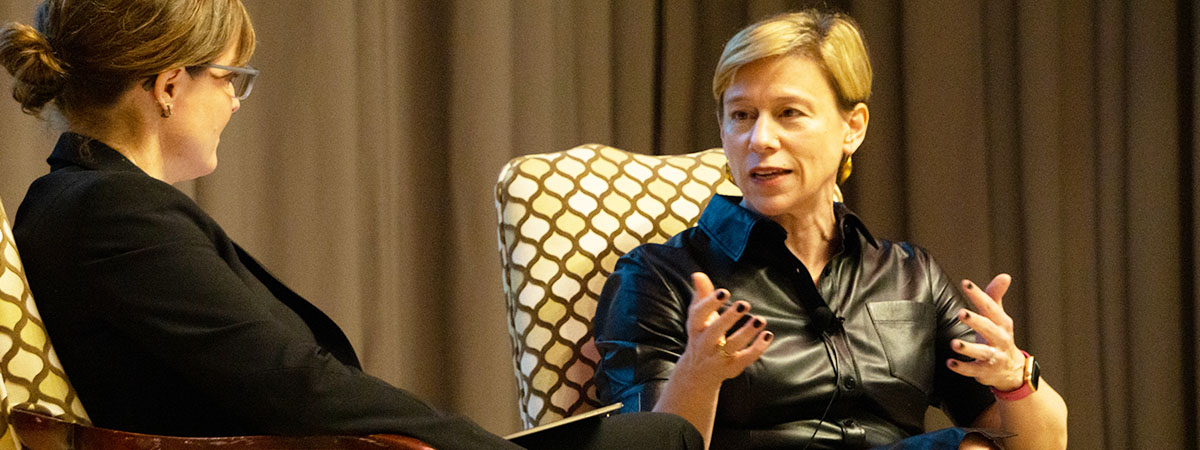At this year’s 26th annual Wharton Health Care Business Conference – called New Frontiers in Health Care – healthcare leaders got real about where the industry is and where it needs to head next. Over two days, executives predicted the Affordable Care Act’s (ACA) future in honor of its tenth anniversary, assessed new gene therapy opportunities, and deliberated on the makings of a breakthrough partnership. And they debated what kind of technology (and the people behind this technology) will best improve care delivery.
Here are just a few key takeaways from some of the panels and keynotes at this year’s conference.
Humana Urged Leaders to Be More Consumer-Centric
Technology like natural language processing will help healthcare transition away from fee-for-service, Bruce D. Broussard, Humana Inc.’s President and Chief Executive Officer, emphasized in a keynote address. Humana’s call center technology, for example, listens to conversations between a member and service representative to determine the best personality matches between the individuals.
“We’re trying to become much more thoughtful of how we connect them,” he said. Members ideally will be connected not according to which representative is available but based on what a particular member prefers, likes, or responds best to according to their individual needs and traits.
“It’s all being learned on the fly – the ability to take voice and convert it to an ability to understand the characteristics, and deploy it back out,” he said. Bruce added that Humana is excited for its data to become more clinically-oriented instead of claims-oriented.
You Can’t “Uber” Healthcare
Biopharma will use data to identify new cures, emphasized Julie Sunderland, Managing Director of Biomatics Capital Partners. Julie, who formerly led $1.5B dollars in investments at the Bill & Melinda Gates Foundation, delivered another keynote presentation.
“The uptake of data into biopharma is where I’ve done most of my investments, because I know there’s an appetite for innovation [there],” she said. “In twenty years, I believe we will have tools that enable us to deliver better healthcare to patients.”
The trajectory by which that innovation happens is frustrating, however.
“Data and technology aren’t enough,” she said. “A lot of healthcare tech entrepreneurs are piling into the space because they think they can transform healthcare with data and technology. You can’t ‘Uber’ healthcare. It’s a complicated, human system.”
Julie urged entrepreneurs to become well-versed in local context instead of technology alone. “It’s about great people applying technology to solve problems,” she said, not about a technology-first approach.
Don’t Call It “Home Care”
Said Rami Karjian, Co-Founder of Medically Home on one of the event's panels, “We try not to talk about home care, because it conjures the wrong images.”
Added Niyum Gandhi, Executive Vice President of Mount Sinai Health System, formerly of Oliver Wyman, “If we take the consumer point of view, they don’t want to even think about the idea of ‘care.’ They don’t think of themselves as ‘patients.’ They think of themselves as ‘people.’ Bringing what we can to them in a way that is most convenient for them. Recognizing the home may play a useful role in that. And at times recognizing certain consumers may not want the home to play a role in that.”
Home care, Niyum suggested, should be redefined as location-agnostic care. For example, consider if a patient engages in a virtual visit while she’s at work. Or how a homeless man receives “home care.”
“There is a uniqueness to the home that doesn’t exist in any other setting simply because [the home] is where they sleep and where they eat,” he said.
Added Monique Reese, DNP, ARNP, FNP, ACHPN, Senior Vice President of Home and Community Care at Highmark Health, “I’ve cared for people whose homes were underneath a bridge. … Most individuals can ground themselves regarding whatever they call ‘home’, whether it’s under a literal bridge, in a back shed, or in a homeless shelter. It depends on the definition of 'home care'. But it’s not patient-centric. It’s person-centric. People look at themselves as individuals and family members. Some of this is semantics, but it’s where we need to look next as we continue to transform.”
More Memorable Moments from the #WHCBC2020 Twitter Conversation:
Here’s a snapshot of soundbites and reactions captured during the speaker panels at the event.
Oliver Wyman Health and The Wharton School have partnered to launch more detailed content from this event soon, including executive Q&As and podcasts. Stay tuned for more perspectives on health transformation!


